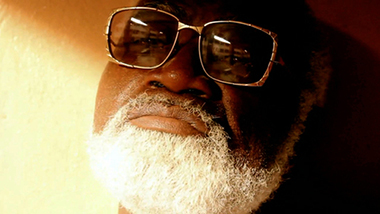The latest film by Jean-Pierre Bekolo, Le Président (Cameroon 2013), is now available in the ASC Library!
 It is a fictitious film, but controversial and has raised instant polemic. Efforts to stop Le Président from screening in Yaoundé has drawn international attention and the film has effectively been banned in the filmmaker's country (Cameroon). Even the Institut Français in Yaoundé has refused to screen the film. In short, Cameroonian authorities didn't approve of the film's seemingly daring plot, which sees the film's fictional president disappear a few days before elections (the country's real-life president, Paul Biya, has been in power for more than 30 years).
It is a fictitious film, but controversial and has raised instant polemic. Efforts to stop Le Président from screening in Yaoundé has drawn international attention and the film has effectively been banned in the filmmaker's country (Cameroon). Even the Institut Français in Yaoundé has refused to screen the film. In short, Cameroonian authorities didn't approve of the film's seemingly daring plot, which sees the film's fictional president disappear a few days before elections (the country's real-life president, Paul Biya, has been in power for more than 30 years).
The mysterious disappearance of the president opens the war of successions between the different actors. The film shows young people becoming restless, intellectuals debating national issues, prisoners making political plans. People are asking difficult questions…
A TV reporter named Jo Woo’du works around the clock to find out what is happening. But when he interviews people on the street who might know about the disappearance, they instead give him confessions about their own problems and fantasies. To ask them about the president is to ask about their own lives. The image of the president’s face is constantly present so that it becomes the flickering backdrop in which their own lives are shown.
Le Pre̒sident is an allegory about the men who run Africa, who would like to see themselves as wild beasts-panther, crocodile, lion- if not as Gods of Africa, and about ordinary people who have to live with the consequences.
In this mix of mockumentary and drama, director Jean-Pierre Bekolo presents a very different African narrative, one which attempts to interrupt notions of genre, not just by mixing fiction and reality but also in its treatment of form and imagery.
The director:
„My intent centers on the figure of the President, locating the film at an ending: the end of a man, the end of a long reign and the end of blame, failures and grievances. We had to find the right tone, poetry, humor and music that would narrate both the fragility of an all-mighty man acting as President as well as the danger inherent in the times to come. Although my first impulse was to find inspiration in Cameroon’s particular situation, maintaining a certain abstraction and a more symbolic narrative treatment was necessary to allow each person to interpret his or her own film.“
Jean-Pierre Bekolo first attracted notice at the age of 25 with Quartier Mozart (1992), a winner at the Film Festivals of Cannes and Locarno and a BFI Award nominee. Other films: Aristotle’s Plot (1996) and Les Saignantes (2005). He also was the creator of the video installation Une Africaine dans l’Espace at the Musée du Quai Branly in Paris (2009).
Elvire Eijkman (October 2013)

